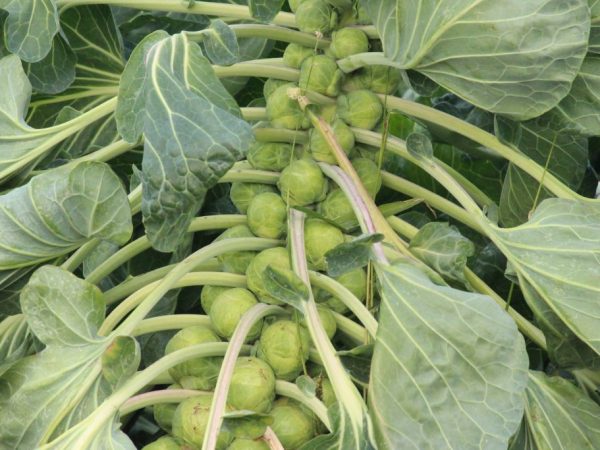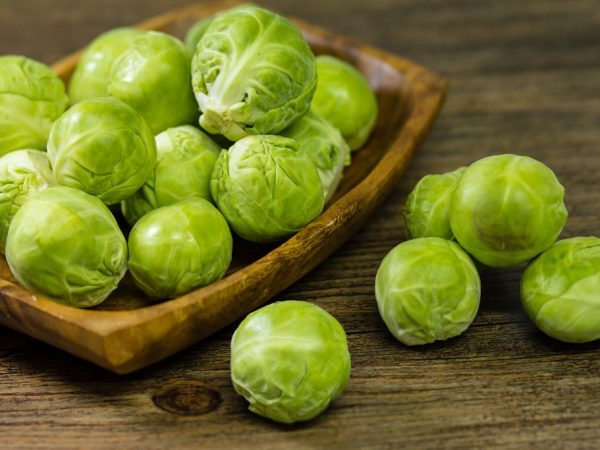Brussels sprouts Hercules
Brussels sprouts Hercules is a late-ripening variety, has a high taste, is rich in vitamins.

Brussels sprouts Hercules
Characteristics of the variety
The Hercules variety is the first variety of Brussels sprouts to take root in Russia.
The ripening period of the Hercules variety is from 140-150 days. The fruits are especially resistant to disease and frost.
At a temperature of 2 ° C, the seeds are already beginning to germinate. This variety is resistant to temperatures of -10 ° C, but the development of vegetable formation is delayed at 25 ° C and above.
Description of fruits
Heads of cabbage are loose, elongated, medium in size. The density of vegetables on one stem is 20-30 heads of cabbage, each weighing 8-14 g on average. The stem of a seedling of medium length is 40-60 cm. The fruits are green, the leaves are gray-green.
Heads of Brussels sprouts Hercules are stored with stems and leaves: this way the vegetable is stored longer. If you separate the stem from the head, the plant will wither quickly. The storage place should be cool, basements are often chosen. Heads of cabbage are stored at a temperature of 0 ° C - 1.5 ° C, due to which the fruits will not spoil for 2 months.
When buying heads of cabbage in stores, attention is paid to the absence of stains, density and color (there should be no yellowness). Fresh vegetables have a strong smell, and frozen fruits often taste bitter. When cooked correctly, the unpleasant odor and bitter taste can be easily eliminated.
Beneficial features
Brussels sprouts are nutrient-dense and contain:
- folic acid (good for the circulatory and immune systems);
- fiber;
- protein;
- B vitamins.
The content of vitamins and proteins in the Hercules variety is three times higher than in the white one. Doctors recommend using it for people suffering from diseases of the cardiovascular system, and with diabetes.

Cabbage is suitable for diet food
It is good for dieters. After surgery, surgeons recommend adding Brussels sprouts to the diet, since it promotes rapid wound healing.
This plant variety is contraindicated to use if a person suffers from stomach diseases. The vegetable causes bloating and also increases acidity.
Care
The sowing depth should be no more than 2 cm, it is necessary to sow in mid-April. The Hercules variety requires good lighting, the place should be not darkened.
The plant takes root well on the ground where legumes were previously grown, as well as tomatoes and cucumbers.
Watering
Brussels sprouts love moisture, so watering should be abundant. Do not overdo it: the water should not stand, although this is extremely rare. Most often watered near the root system. Loosening is necessary after watering. There should be no weeds.
Fertilizers
Fertilize well:
- humus;
- chalk;
- ash;
- nitrophobic.
It is necessary to feed the soil twice - as soon as the second leaf of the seedling appears, and 7 days after that. When watering, you can use potassium chloride (30 grams per 10 liters of water).
Greenhouse and greenhouse care
The Hercules plant variety is grown both in greenhouses and greenhouses. The Hercules variety loves moisture: this way the fruits sprout faster. Growing in apartments is almost impossible, since this vegetable does not tolerate high air temperatures and needs good lighting.
Seeds for seedlings are planted in boxes with soil to a depth of 1 cm at a distance of 5-6 cm from each other. Watered with settled water. The box is covered with glass or foil.
Harvest
The top of the plant is either pinched off or cut off a month before harvest, which helps the crop grow. The crop is harvested in the middle of autumn, as soon as the first frosts appear.
Conclusion
Brussels sprouts Hercules are well suited for growing in all areas. Caring for this variety is simple, does not require chemical fertilizers, and is frost-resistant. The vegetable is rich in proteins and vitamins, has a lot of useful properties. The fruits are consumed both fresh and cooked. Brussels sprouts are used to prepare delicious meals. Growing at home is problematic, it is better in greenhouses or hotbeds.

